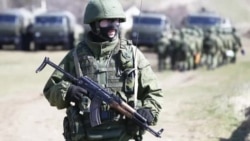On March 29, the Russian Embassy in U.K. Twitter account posted a quote from Russian Foreign Ministry spokesperson Maria Zakharova:
“MFA spox #Zakharova: #NATO keeps using mythical Russian aggression to justify increase of military funding and potential, the biggest since #ColdWar, incl on the eastern flank.”
The claim that Russian military aggression is a “myth” created to justify rising NATO spending is false.
The timing of Zakharova’s statement is critical: In recent weeks, Russian-backed forces occupying parts of eastern Ukraine’s Donetsk and Luhansk oblasts have violated a July 2020 ceasefire between the Ukrainian military and Russia-backed separatists. Several Ukrainian military personnel have been killed in attacks.
At the same time, the Ukrainian military has warned of a Russian buildup of forces on along the border between the two countries.
On March 27, Oleksiy Arestovych, spokesman for the Ukrainian delegation to the Trilateral Contact Group responsible for negotiating a peace agreement, reported that since the ceasefire agreement was reached, 45 Ukrainian military personnel have been killed and 317 wounded. Of those, 21 have been killed this year.
On March 28, Ukrainian forces reported 10 ceasefire violations by Russian-led forces. The following day – the day of the Russian U.K Embassy’s tweet – seven ceasefire violations were reported. The Organization for Security and Cooperation in Europe’s Special Monitoring Mission in Donbas (OSCE SMM), whose observers record ceasefire violations, has reported even higher figures. On March 29, the OSCE SMM reported 153 ceasefire violations from March 26 to March 28 in the Donetsk region alone.
The ceasefire violations by Russia-backed forces have been accompanied by worrying developments along the country’s border with Ukraine. The U.S. military noted that Russian troop levels at the border have not dropped since military exercises ended on March 23. While U.S. estimates of Russian troop levels in the region vary, the U.S. military’s European command has raised its level of alert from “potential crisis” to “imminent crisis,” the highest level.
Meanwhile, Ukraine’s military commander-in-chief, Col. Gen. Ruslan Khomchak, said in a March 30 interview that the country’s general staff was preparing for “any scenario” with Russia, including an attempted Russian military breakthrough toward the Crimean peninsula, which Russia has occupied since 2014. Ukraine’s National Security and Defense Council earlier signaled that it was prepared for any move by Russia.
Russia denies any connection to the war in Donbas and insists Crimea is Russian territory. Since occupying the peninsula in 2014, Russia has conducted snap drills near the borders of NATO member states, and Russian military aircraft have repeatedly violated their air space.
Shortly after the annexation and occupation of the Crimea in 2014, Russia fomented an uprising in Ukraine’s eastern Donbas region, intervening militarily by providing arms, mercenaries, and on occasion, regular Russian troops. Evidence of Russian involvement ranges from captured Russian POWs, Russian weapons and equipment never produced or purchased by Ukraine, and the social media or public admissions by Russian fighters who have taken part in the conflict. To date, an estimated 13,000 people have lost their lives in the conflict. In response to Russia’s involvement, the U.S., European Union, and several other countries imposed sanctions on Russia.
Russia has been implicated in espionage, assassinations and attempted assassinations on European soil, including the attempted poisoning of former Russian spy Sergey Skripal in Salisbury, U.K., in 2018. Russia continues to deny involvement in that attempt, even though British authorities implicated two Russian nationals who were later connected to Russia’s military intelligence.
On March 31, Italy expelled two Russian diplomats after arresting an Italian navy captain who now stands accused of spying for Russia.






